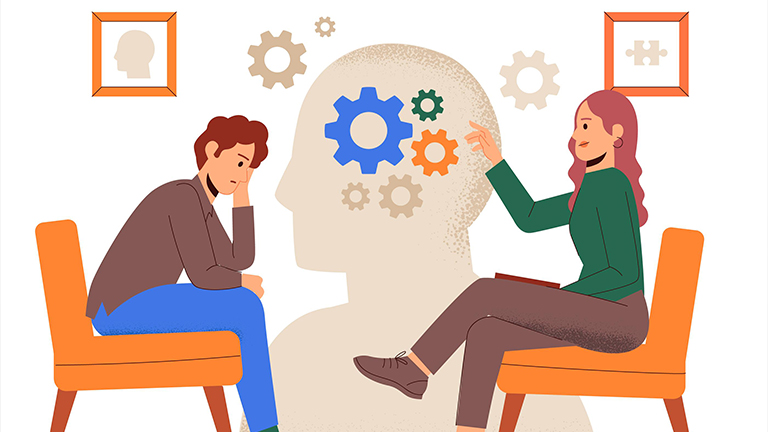Mental health challenges such as anxiety, depression, and stress affect millions of people worldwide. One of the most researched and widely used forms of psychotherapy is Cognitive Behavioural Therapy (CBT). Known for its practical approach and evidence-based effectiveness, CBT helps individuals identify negative thought patterns, challenge them, and develop healthier coping strategies. In this article, we will explore what cognitive behavioural therapy is, its methods, techniques, benefits, and effectiveness compared to other treatments.
What is Cognitive Behavioural Therapy (CBT)?
Cognitive Behavioural Therapy (CBT) is a form of psychological treatment that focuses on the connection between thoughts, emotions, and behaviors. The core principle is that negative thought patterns contribute to emotional distress and unhealthy behaviour, and by restructuring these thoughts, individuals can improve their mental well-being.
Understanding Cognitive Behavioural Therapy
CBT is based on the idea that our thoughts (cognitions) influence our feelings and actions. For example, if someone constantly believes “I’m not good enough,” this thought may lead to sadness, anxiety, or avoidance behaviours. CBT teaches individuals how to recognise and replace negative thoughts with balanced, realistic ones.
History and Development of CBT
CBT was developed in the 1960s by Dr. Aaron T. Beck, a psychiatrist who noticed that his patients often had distorted, automatic negative thoughts that contributed to their depression. Over the decades, CBT has evolved into a structured, evidence-based therapy used worldwide for a wide range of mental health conditions.
How Cognitive Behavioural Therapy Works
CBT operates on the principle of the cognitive model, which suggests that our perceptions of situations—not the situations themselves—determine how we feel and behave. Through structured sessions, CBT helps individuals:
- Identify negative automatic thoughts
- Challenge cognitive distortions
- Practice healthier coping strategies
- Apply skills in real-life situations
CBT Techniques & Methods
Cognitive Restructuring
One of the most common CBT therapy techniques is cognitive restructuring, which involves identifying irrational or harmful thoughts and reframing them into more balanced perspectives.
Exposure Therapy
This method is particularly effective for CBT for anxiety disorders and phobias. Patients are gradually exposed to feared situations or objects to reduce avoidance and build resilience.
Behavioural Activation
Often used in CBT for depression, behavioural activation encourages individuals to engage in positive, rewarding activities to counteract withdrawal and low mood.
Mindfulness in CBT
Modern CBT often integrates mindfulness techniques, helping individuals stay present and reduce rumination. Mindfulness-based CBT is especially effective for preventing relapse in depression.
Applications of CBT
Cognitive Behavioural Therapy for Anxiety Disorders
CBT is considered one of the most effective treatments for anxiety disorders, including generalized anxiety disorder (GAD), panic disorder, phobias, and social anxiety.
Cognitive Behavioural Therapy for Depression
Through identifying and challenging negative thought patterns, CBT helps individuals manage depressive symptoms and improve daily functioning.
Cognitive Behavioural Therapy for PTSD and Trauma
CBT techniques such as trauma-focused cognitive restructuring and exposure therapy are proven to reduce symptoms of post-traumatic stress disorder.
Cognitive Behavioural Therapy for Stress and Anger Management
CBT provides coping strategies to manage stress, frustration, and anger, reducing emotional reactivity and improving relationships.
Benefits of Cognitive Behavioural Therapy
Short-Term and Long-Term Benefits
- Provides practical coping skills quickly
- Effective in as few as 6–20 sessions
- Reduces risk of relapse for depression and anxiety
- Helps improve self-awareness and emotional regulation
Effectiveness Compared to Other Therapies
Research consistently shows that CBT is as effective, or more effective, than medication or other forms of talk therapy for many mental health disorders. Unlike medication, the benefits of CBT often last after treatment ends because patients continue to use learned skills.
Practical Aspects
What to Expect in a CBT Session
A typical CBT session lasts 45–60 minutes and is highly structured. Clients work collaboratively with their therapist to set goals, review progress, and practice new techniques through exercises or homework.
Self-Help CBT Techniques
Self-guided CBT exercises can include:
- Keeping thought journals
- Practising relaxation techniques
- Using CBT worksheets
- Engaging in mindfulness and meditation
Online Cognitive Behavioural Therapy
With the rise of telehealth, online CBT therapy has become increasingly popular in the USA, UK, and Canada. Studies show that digital CBT can be as effective as in-person sessions, offering greater accessibility and flexibility.
Challenges & Considerations
Limitations of CBT
While CBT is effective for many, it may not address deeper-rooted issues such as unresolved trauma or personality disorders. It also requires active participation and commitment from patients.
Who CBT Is Most Effective For
CBT is most effective for individuals experiencing:
- Anxiety disorders
- Depression
- PTSD
- Stress-related conditions
- Sleep problems
- Phobias
It may be less effective for individuals unwilling to engage in structured exercises or those with severe cognitive impairments.
Conclusion
Is CBT the Right Choice for You?
Cognitive Behavioural Therapy (CBT) is a powerful, evidence-based approach that helps people transform negative thinking patterns, manage emotions, and improve behaviour. Whether you are struggling with anxiety, depression, trauma, or stress, CBT provides structured, practical tools that can lead to lasting change. With options for in-person and online CBT therapy, this treatment is accessible and effective across the USA, UK, and Canada.
If you’re considering therapy, CBT may be the right choice to guide you toward better mental health and overall well-being.


